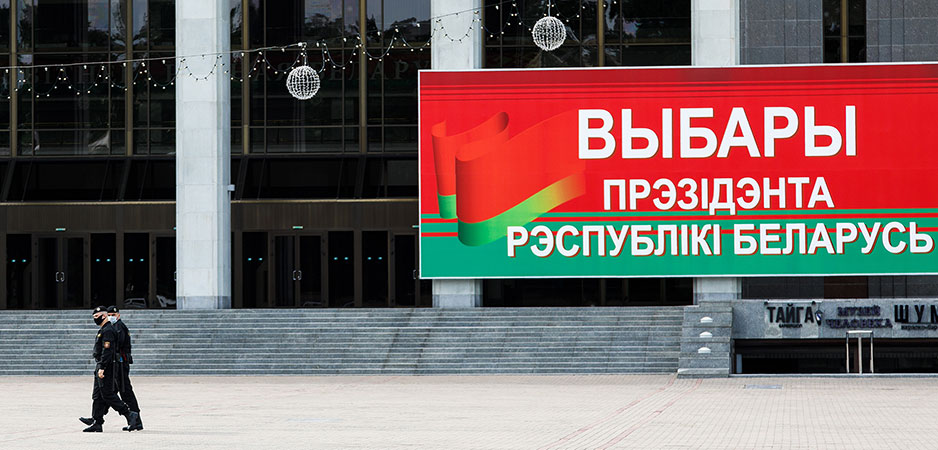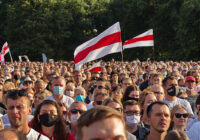It’s not that Belarus hasn’t had any protests recently. It’s just they have never been this big and this bloody. The capital, Minsk, has seen the use of military machinery, grenade explosions and special forces attacking both protesters and innocent bystanders. Smaller cities are experiencing major rallies, too. At least two people have died. Hundreds have been injured and nearly 7,000 arrested.
Journalists were attacked. Not that they were not attacked before, but again, it was never on a scale this massive and brutal. The regime blocked some of the popular media platforms which published independent content. I learned about some of my colleagues being detained. They were missing for days — no one knew what happened to them. Then, suddenly, the law enforcers decided to reveal that the journalists were, in fact, detained and that charges were being pressed against them.
Belarus Election Unleashes Unprecedented Anti-Government Protests
When asked about the protests, Alexander Lukashenko rather unoriginally responded that they were being directed and funded from abroad. He also claimed that it was the foreign interference that blocked the internet in the country. Despite a lack of information and increasing violence, people managed to communicate via VPN and some encrypted channels. They keep protesting.
Neither Free nor Fair
Belarusians took to the streets on the evening of August 9, as voting stations were shutting down. This was hours before Lukashenko, the incumbent president, was announced to have won 80% of the vote in an election widely claimed to be fraudulent that the EU called “neither free nor fair.” Lukashenko’s victory means a sixth term — and at least five more years — in office. He has ruled the country for 26 years already and is the only president independent Belarus has ever had.
Throughout his rule, Lukashenko had a low track record on human rights and managed to extend a nearly total control over the media, the military and the courts. He nearly succeeded in crushing all dissent and opposition. Previous protests were either brutally dispersed or died down on their own. However, the events leading up to the election demonstrated that some big changes were taking place in Belarus.
First of all, the opposition has managed to unite around an unlikely leader, Svetlana Tikhanovskaya, whose husband, a popular vlogger-turned-candidate Sergei Tikhanovsky, was arrested and blocked from standing in the election. Second of all, the level of popular dissatisfaction has reached its all-time high, with people becoming increasingly disillusioned with the regime and its handling of the many crises facing Belarus. The pre-election protests, combined with post-election rallies, in Minsk as well as other major cities, have attracted the biggest crowds in the country’s modern history.
On election day, people could not vote properly. There were long lines at voting stations, and many were unable to enter at all. The regime spoke about an unusually high rate of early voting. Some foreign journalists were detained and deported, and the internet worked only intermittently. Independent observers were detained across the country following reports of violations, and the OSCE’s Office for Democratic Institutions and Human Rights has withdrawn its mission, leaving “no credible observers overseeing the election.”
No Surprises
Consequently, the announcement of Lukashenko’s sweeping victory surprised no one. It was also not surprising that people took to the streets to contest the result. What was surprising was the scale of the protests, their continuation despite a vicious crackdown and the level of fear that the regime has shown when attacking the demonstrators. Many people are missing, presumably detained, with widespread reports of inhumane treatment and beatings. The pictures of bloodied marchers on the streets of Minsk show the dangers of fighting for a right as basic as free elections.
Tikhanovskaya fled the country to neighboring Lithuania, following a brief disappearance after a visit to the election commission to file an appeal. She later recorded a video where she asked people not to protest. Many speculate she’s being blackmailed by the regime.
The protests have continued for four days, with a little dialogue between the opposing sides. Women have come out wearing white, with people forming human support chains, while doctors and workers at a number of factories across the country have walked out in protest. On August 12, more than 500 CEOs, investors and employees in the IT sector — the pride of Belarusian economy — have signed a letter calling for an end to violence and a new election, threatening to move their businesses elsewhere. There will potentially be an escalation or an attempt to quash the protest movement by the increasing use of force.
It is perhaps logical to be hopeful and to expect that change will come so that Belarus can transform into a more transparent country where human rights are respected and where citizens can vote, express themselves, enjoy peace and stability, and elect representatives who will follow democratic principles. However, even now, it’s hard to predict what happens next.
The protests have made a big crack in what is often referred to as Europe’s last dictatorship, but the regime remains strong. During his rule, Lukashenko had managed to maneuver Belarus between an assertive Russia while still maintaining limited contact with European leaders. So far, Germany has called for a reintroduction of sanctions that were lifted in 2016 to bolster cooperation, and Poland wants an emergency summit to discuss what the EU has condemned as “disproportionate and unacceptable state violence against peaceful protesters.” But with the resources at his disposal, Lukashenko can remain in power unless both domestic and external pressure are applied equally strongly and consistently. The following days will show how the domestic situation evolves, and whether an external response will follow.
The views expressed in this article are the author’s own and do not necessarily reflect Fair Observer’s editorial policy.
Support Fair Observer
We rely on your support for our independence, diversity and quality.
For more than 10 years, Fair Observer has been free, fair and independent. No billionaire owns us, no advertisers control us. We are a reader-supported nonprofit. Unlike many other publications, we keep our content free for readers regardless of where they live or whether they can afford to pay. We have no paywalls and no ads.
In the post-truth era of fake news, echo chambers and filter bubbles, we publish a plurality of perspectives from around the world. Anyone can publish with us, but everyone goes through a rigorous editorial process. So, you get fact-checked, well-reasoned content instead of noise.
We publish 2,500+ voices from 90+ countries. We also conduct education and training programs
on subjects ranging from digital media and journalism to writing and critical thinking. This
doesn’t come cheap. Servers, editors, trainers and web developers cost
money.
Please consider supporting us on a regular basis as a recurring donor or a
sustaining member.
Will you support FO’s journalism?
We rely on your support for our independence, diversity and quality.






